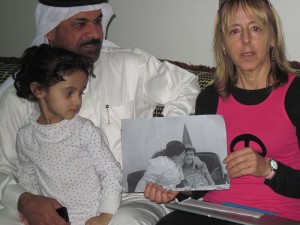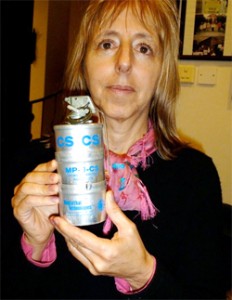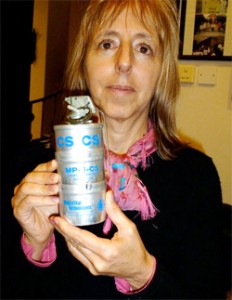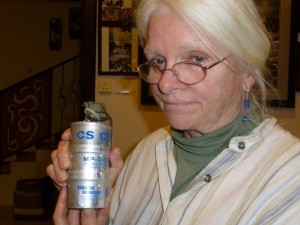
Medea (right) holding photo of a boy in hospital who died from tear gas in Sitra, Bahrain
Medea Benjamin, cofounder of Code Pink and Global Exchange, was deported from Bahrain for joining a peaceful women’s march that was broken up by tear gas.
—
John Timoney is the controversial former Miami police chief well known for orchestrating brutal crackdowns on protests in Miami and Philadelphia- instances with rampant police abuse, violence, and blatant disregard for freedom of expression. It should be of great concern that the Kingdom of Bahrain has brought Timoney and John Yates, former assistant commissioner of Britain’s Metropolitan Police, to “reform” Bahrain’s security forces.
Since assuming his new position, Timoney has claimed that Bahrain has been reforming it brutal police tactics in response to recommendations issued by the Bahrain Independent Commission of Inquiry. He says that there is less tear gas being used and that while tear gas might be “distasteful,” it’s not really harmful.
I have no idea what country Chief Timoney is talking about, because it’s certainly not the Bahrain I saw this past week, a week that marked the one-year anniversary since the February 14, 2011 uprising.
I was in Bahrain for five days before being deported for joining a peaceful women’s march. During my stay, I accompanied local human rights activists to the villages where protests were raging and police cracking down. Every day, I inhaled a potent dose of tear gas, and came close to being hit in the head with tear gas canisters. Every evening I saw the fireworks and smelled the noxious fumes as hundreds of tear gas canisters were lobbed into the village of Bani Jamrah, next door to where I was staying. The villagers would get on their roofs yelling “Down, Down Hamad” (referring to the King). In exchange, as a form of collective punishment, the whole village would be doused in tear gas. I went to bed coughing, eyes burning, wondering how in the world the Bahrainis can stand this.
Tear gas is supposed to be used to disperse violent gatherings that pose a threat to law and order. It is not supposed to be used on unarmed protesters who are simply exercising their freedoms of expression and assembly.
“Shamefully, Bahrain has the highest tear gas use, per capita, in the world,” said human rights activist Nabeel Rajab. “And the police don’t just shoot outside to disperse crowds. They use the tear gas canisters as weapons, shooting them directly at people. And they shoot the gas right into people’s houses. If Mr. Timoney thinks the use of tear gas here is ‘moderate,’ he has obviously not spent many evenings in Bahraini villages.”
Timoney also told reporters that there is no evidence that tear gas has killed anyone. He should meet Zahra Ali, the mother of Yassin Jassim Al Asfoor.
On November 19, 2011, riot police—running around the village of Ma’ameer searching for a few people chanting anti-government slogans—fired three tear gas canisters directly into her home.
Everyone in the family started choking, especially 13-year-old Yassin, who suffered from asthma. Yassin could barely breathe. Panicking, his parents called an ambulance. “I’m dying from the tear gas, I’m dying,” Yassin cried on the way to the hospital. He struggled desperately to survive for the next 29 days before his lungs simply collapsed.
Zahra lovingly showed me photos of Yassin donning a party hat, celebrating his 14th birthday in the hospital a few days before he died. “All the doctors and nurses loved him—Sunni, Shia, everyone. They even came here for his funeral,” she said proudly.
I asked Zafra if she had a message about the tear gas for Police Chief Timoney. “Just ask him if he has ever lost a child,” she whispered.
Timoney should also meet the parents of 14-year-old Ali Jawad al-Sheik. He did not die from inhalation. No. He was killed on August 31, 2011, when the police fired tear gas at protesters from roughly 20 feet away. A canister busted open the young boy’s face. To his parent’s furor, the autopsy said the cause of death was “unknown.”
The same thing happened exactly four months later to 15-year-old Sayyed Hashem Saeed. The police then used tear gas to disperse mourners at Sayyed’s funeral.
Faisal Abdali, a businessman who lives at the entrance of Sitra, would also love to speak to the police chief. He is hopping mad and wants some justice and accountability.
For months now, as the police enter the village of Sitra, they have been tossing tear gas directly into his house. Every time he lodged a complaint, the house would be targeted even worse the next day.
Faisal had taped up all the windows and sealed the air conditioners to keep the gasses out. On January 27, 2012 the police shot tear gas inside the garage. When Faisal’s wife opened the garage door, the gasses filled the house. Everyone felt sick, especially Faisal’s father—a healthy 58-year-old. He started vomiting, and went to bed early in the hopes that he would feel better the next day. When Faisal opened his father’s bedroom door the next morning, he found him lying on the floor. Five days later, he was dead. The doctor said he died from tear gas but he was not allowed to put that on his death certificate.
Faisal showed me about ten of the canisters that had been thrown into his house. Three of them came from Combined Systems in Jamestown, Pennsylvania and three from factories in Brazil. The rest had no markings at all. Faisal thought that the unmarked ones were the most toxic.
A Bahraini doctor told Physicians for Human Rights (PHR) about the different types of gas she found in the villages. “[There was] a white gas and a yellow one, but I also saw a third gas of a blue color from a distance. The gas felt like a poison, like a thousand knives and needles all over your body; what kind of tear gas is supposed to affect people this way? I have seen tear gas patients who are in a state of convulsion that never ends, like a prolonged seizure.”
Other Bahraini doctors have noted that the symptoms of the tear gas are unusual. When they asked the Ministry of Health to run tests on the gas canisters, their requests were denied.
Since the long-term effects of prolonged and repeated exposure to tear gas has never been studied, physicians and environmentalists in Bahrain have begun to worry about the impact that repeated exposure to these chemicals may have on the general population.
On January 26, 2012, Amnesty International called on Bahrain to investigate 13 deaths that followed the misuse of tear gas by security forces. At least three of those deaths occurred after Timoney was hired.
Environmentalist Moh’d Jawad Fursan told me that there are no accurate records of how many people have died from the tear gas, since doctors are not allowed to report this as the cause of death. He thinks more than 13 people have died and thousands have been affected, particularly the young and the elderly. Fursan says the rates of miscarriages and stillborn babies have increased, and he expects the rates of cancer will soar, as well as babies born with deformities.
The day before I was deported from Bahrain, I visited the home of a poor extended family where 44 people lived in an open-air complex. They had one tiny, windowless room that was covered; they called this the “safe room” for the little children. The day I visited, there was a nursing mother of a 2-week-old child, another baby and a two year old. This “safe room,” just like the open space around it, reeked of tear gas. “The babies cry, their eyes are all red and swollen, they get skin rashes, but what can we do?”, sighed the young mother. “We have no way to protect our children. We have nowhere to hide.”
Mr. Timoney, I suggest you take another tour of Bahrain, led not by government minders but by women from the villages. (Make sure you bring along a gas mask.) I also suggest you donate the blood money you’re taking from the Bahraini government to a fund for the tear gas victims.




 Medea Benjamin, Co-founder of
Medea Benjamin, Co-founder of  Tens of thousands of people flooded the main Budayia road. First were the men, mostly young; then came the women. They were shouting defiant chants like “We won’t obey your orders; we will break the chains.” They were calling on the prime minister to step down, shouting “Forty years is enough!”
Tens of thousands of people flooded the main Budayia road. First were the men, mostly young; then came the women. They were shouting defiant chants like “We won’t obey your orders; we will break the chains.” They were calling on the prime minister to step down, shouting “Forty years is enough!” The men, trying to protect the women from any police repression, set up a blockade to push the women onward toward the permitted march. Meanwhile, thousand of young men started sprinting towards the Pearl Roundabout. Although the protest was totally peaceful, the police (most of whom are not Bahraini and many of whom don’t even speak Arabic), responded with an overwhelming barrage of teargas, as well as birdshot and rubber bullets.
The men, trying to protect the women from any police repression, set up a blockade to push the women onward toward the permitted march. Meanwhile, thousand of young men started sprinting towards the Pearl Roundabout. Although the protest was totally peaceful, the police (most of whom are not Bahraini and many of whom don’t even speak Arabic), responded with an overwhelming barrage of teargas, as well as birdshot and rubber bullets. A person with a carload of passengers saw us. He pulled the car off the road and the passengers jumped out to make room for me, Tighe, Mohammad and two other Americans in our group. A perfect stranger, the driver took terrific care of us and thanked us for bearing witness to their struggle.
A person with a carload of passengers saw us. He pulled the car off the road and the passengers jumped out to make room for me, Tighe, Mohammad and two other Americans in our group. A perfect stranger, the driver took terrific care of us and thanked us for bearing witness to their struggle.